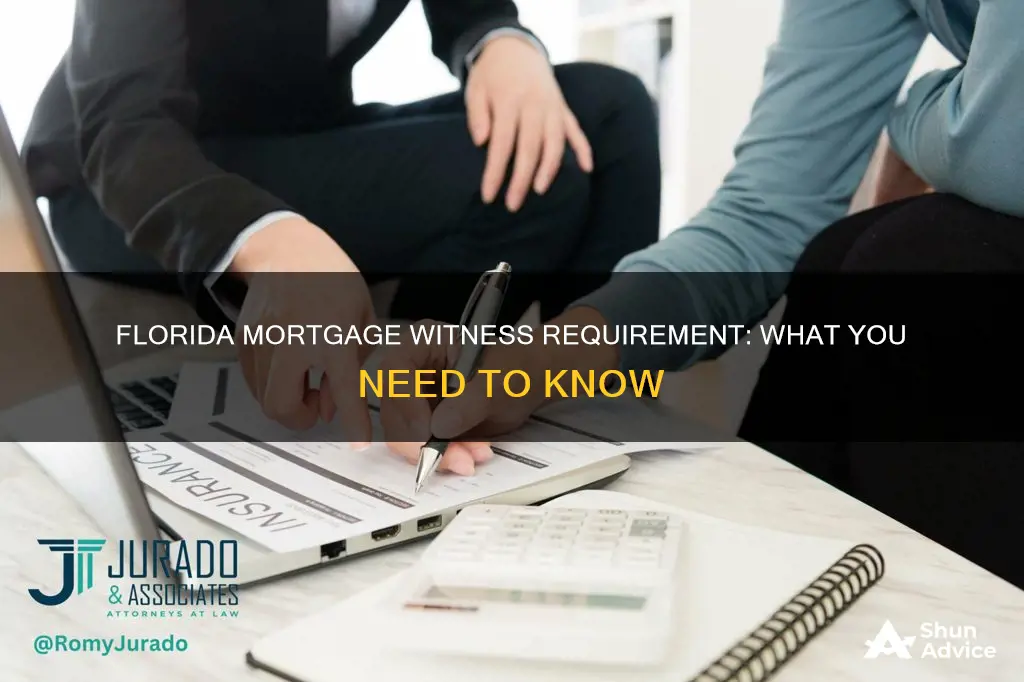
In the State of Florida, mortgages do not require witnesses, only a notary public's acknowledgment. However, most mortgage forms are designed to have two witnesses, one of whom can be the notary public, to give the mortgage a `formal` appearance. This is because deeds in Florida require witnesses, so mortgages follow the same procedure. While a mortgage without a second witness is not invalid, some lenders may reject the mortgage package. Starting in 2024, Florida Statutes require the address of each witness to be included on certain recorded documents, including mortgages.
| Characteristics | Values |
|---|---|
| Does a Florida mortgage require two witnesses? | No, it does not require witnesses but must be acknowledged by a notary public |
| Is it common to have two witnesses? | Yes, most mortgage forms are designed to have two attesting witnesses, one of which can be the same individual who signs as a notary public |
| Is it mandatory to have two witnesses? | No, a mortgage lacking a second witness is not invalid |
| What if there are no witnesses? | Some lenders may reject the mortgage package and send it back to the closing agent |
| What is the benefit of having two witnesses? | It gives the mortgage a "formal" appearance in regard to the manner of execution |
| What is the latest update in the law? | From January 1, 2024, the printed, typewritten, or stamped name of each witness along with their post office address must be included in the documents |
What You'll Learn
- Florida mortgages do not require witnesses
- Florida deeds require witnesses
- The Florida Legislature passed a bill in 2020 removing the two-witness requirement for leases
- Lenders may reject a mortgage package without two witnesses
- Florida's Witness Address Rule: from January 1, 2024, the address of each witness must be included on recorded documents

Florida mortgages do not require witnesses
However, it is important to note that most mortgage forms are designed to have two attesting witnesses, one of whom can be the notary public. This is done to please lenders, who often request witnesses to attest to having witnessed the borrower's signature. As a result, some lenders may reject a mortgage package without witnesses, sending it back to the closing agent.
In addition, starting in 2024, Florida Statutes will require the post office address of each witness to be included on certain recorded documents, including mortgages. This change will ensure that documents presented for recording without the required witness addresses may be rejected by the recording clerk, even if witnesses are not required.
The removal of the witness requirement for mortgages in Florida brings the state in line with most other states and simplifies the process. It is worth noting that only a few states, including Connecticut, Georgia, Louisiana, and South Carolina, still mandate two witnesses for lease execution.
Mortgage Dips: What's the Real Deal?
You may want to see also

Florida deeds require witnesses
In the State of Florida, mortgages do not require witnesses as a matter of law. However, as a matter of good practice, most mortgage forms are designed to have two attesting witnesses, one of whom can be the same individual who signs as a notary public for the acknowledgment of the mortgagor's signature. This is done to give the mortgage the same "formal" appearance in regard to the manner of execution as deeds, which do require witnesses.
Florida deeds require two witnesses to be recorded, with the name of each witness legibly printed, typewritten, or stamped immediately below their signature. This is to ensure that the witnesses saw the seller sign the deed. A notary can also notarize the deed, but they do not count as one of the two required witnesses unless they also sign as a witness. The witnesses should be in the presence of the Grantor when they sign the deed and should not sign if the Grantor signed the deed out of their presence. The witnesses must be 18 years or older and of sound mind.
Beginning January 1, 2024, the U.S. mailing address of each witness will also be required and must be legibly printed, typewritten, or stamped on the deed. This is part of a fraud prevention pilot program that was launched in 2023 in Lee County, Florida. The program requires all persons listed on a deed to provide a government-issued photo ID before processing the deed, making it easier for law enforcement to investigate fraudulent property-related activity.
It is important to note that Florida Statute Section 95.231(1) "cures" a lack of necessary witnesses to a deed when the deed has been recorded for 5 years. After this period, the statute validates the otherwise invalid deed.
Cosigner Rights: What Are They and Do They Matter?
You may want to see also

The Florida Legislature passed a bill in 2020 removing the two-witness requirement for leases
In Florida, mortgages do not require witnesses, only an acknowledgment by a notary public. However, most mortgage forms are designed to have two attesting witnesses, one of whom is usually the notary public. This is because it is considered good practice, and lenders often expect to see two witnesses.
On June 27, 2020, Florida Governor Ron DeSantis signed House Bill 469 into law, removing the requirement of two witnesses for a lease of real property. This bill amended Florida Statute §689.01, also known as the Statute of Conveyances. The change simplified the process of executing leases and brought Florida in line with most other states, where such a requirement had been removed long ago.
The two-witness requirement had been in place since 1829, before Florida became a state, and was originally intended to prevent fraud or forgery. However, over time, the requirement became seen as a cumbersome formality, with Florida courts increasingly moving away from enforcing it. In the modern era, the requirement posed a hurdle to the electronic execution of leases, which is the current trend.
The removal of the two-witness requirement for leases has been welcomed as a positive step, improving the speed and efficiency of transactions and bringing Florida into the modern era of leasing law. It is no longer necessary for landlords and two witnesses to be physically present to sign a lease, which was particularly problematic during the social distancing requirements of the pandemic.
Cosigner Impact: Mortgage Approval and Beyond
You may want to see also

Lenders may reject a mortgage package without two witnesses
In the State of Florida, mortgages do not require witnesses as a matter of law. However, most mortgage forms are designed to have two attesting witnesses, one of whom can be the notary public who acknowledges the mortgagor's signature. This is because, in practice, it is good to have witnesses, and it is a common procedure to give the mortgage a "formal" appearance in terms of execution.
Some lenders may reject a mortgage package without two witnesses. Closing agents are usually careful to procure two witnesses on mortgages to please the lenders who hire them to handle the loan closing. Lenders may ask for witnesses to attest to having witnessed the borrower's signature.
While the law does not require witnesses, mortgages must be acknowledged by a notary public to be recorded. This is in contrast to deeds of conveyance, which require two witnesses and a notary acknowledgment.
Florida has recently amended its laws to remove the requirement of two subscribing witnesses for leases of real property, bringing it in line with most other states. This change simplifies the lease execution process and reduces the number of parties seeking to exit deals on technical grounds. The requirement posed a hurdle to the electronic execution of leases, which is the modern trend.
From January 1, 2024, Florida Statutes will require the post office address of each witness to be included on certain recorded documents, including mortgages. Documents without witness addresses are likely to be rejected by the recording clerk, even if witnesses are not required.
Cosigner Impact: Can You Get a Higher Mortgage?
You may want to see also

Florida's Witness Address Rule: from January 1, 2024, the address of each witness must be included on recorded documents
In the State of Florida, mortgages do not require witnesses as a matter of law. However, as a matter of good practice, most mortgage forms are designed to have two attesting witnesses, one of whom can be the same individual who signs as a notary public for the acknowledgment of the mortgagor's signature.
From January 1, 2024, Florida's Witness Address Rule will come into effect. This rule requires the address of each witness to be included on recorded documents. This is an amendment to Florida Statute 695.26, which applies to "instruments by which the title to real property or any interest therein is conveyed, assigned, encumbered, or otherwise disposed of". This includes deeds, mortgages, restrictive covenants, and easements. The new rule will aid in properly identifying witnesses during the transfer of property and is a measure aimed at curbing the rise of property fraud in the state.
The address of each witness must be clearly printed, stamped, or typewritten below the signature and name. This requirement applies to any document that could be submitted for recording in Florida, even if witnesses are not required for that particular document. If a document presented for recording after January 1, 2024, does not include the required witness addresses, it is likely to be rejected by the recording clerk.
It is important to note that this rule does not change the fact that mortgages in Florida do not need witnesses and only require an acknowledgment taken by a notary public. However, the new rule means that if witnesses are included, their addresses must also be provided for the document to be accepted.
Fannie Mae Mortgage Note: Grace Period Explained
You may want to see also
Frequently asked questions
No, a Florida mortgage does not require two witnesses. However, it must be acknowledged by a notary public.
Yes, Florida Statute Section 197.122 and 197.162 may apply. It is best to consult with a local underwriter for information relating to real estate taxes on the subject property.
No, Florida has removed the requirement for two witnesses to the execution of a lease. This change was made in 2020 and brought Florida in line with the majority of other US states.
Yes, starting January 1, 2024, the printed, typewritten, or stamped name of each witness must be included on certain recorded documents, along with the post office address of each witness.







